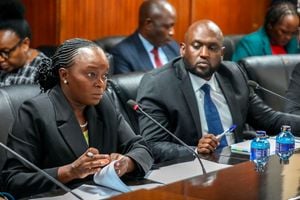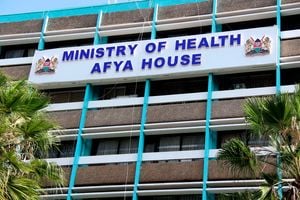
Senators say the multi-billion shilling contracts signed between counties and the national government for lease of medical equipment are illegal
The multi-billion shilling contracts signed between counties and the national government for the lease of medical equipment are illegal, the Senate Public Accounts Committee has warned.
The contracts seek to supply medical equipment to county-owned hospitals on lease terms, Under the National Equipment Service Project (NESP).
Appearing yesterday before the Senate Public Accounts Committee (PAC), Council of Governors (CoG) Vice Chairperson Mutahi Kahiga said the devolved units ‘had no choice’ but to sign the lease contracts, even as they were kept in the dark regarding details of the agreements-- including the identity of suppliers of the equipment.
The Senate PAC chairman, Moses Kajwang’, however questioned why governors allowed the national government to procure the equipment single-handedly.
“How was the decision made and under what procurement law and how are you sure that the cost of running the equipment constitutes value for money after admitting that counties’ work was to just pick the equipment already chosen by the national government?” paused Senator Kajwang’.
“It will be very difficult to defend devolution if governors are allowing themselves to get into such arrangements. You must ensure that whatever procurement decisions are made are those that offer value for money for people rather than a few cartels,” he added.
The National Equipment Service Project is the successor to the controversial Medical Equipment Service (MES), which saw Kenyans part with Sh63 billion in deals that remain shrouded in secrecy to date and caused massive losses to taxpayers after the national government dumped on counties' dysfunctional equipment.
Leasing deals
The Health ministry had for months promised better handling of leasing deals under the NESP, but documents seen by Nation point to higher costs of healthcare under the new Social Health Authority (SHA)-funded scheme.
Under NESP, the undisclosed supplier of equipment will install an assortment of machines to county-owned facilities, and will in turn receive payments directly from SHA.
The supplier will reap billions of shillings almost instantly, as their leasing fees will consume most of the money paid by SHA on behalf of patients.
Senators yesterday described the NESP arrangement as “an opaque leasing scheme and cartel-like arrangement”, warning that it has all the hallmarks of the controversial Sh63 billion MES scandal where taxpayers’ billions went down the drain.
At least 37 counties have already signed agreements with the Health ministry for supply of the equipment by Afya House.
Health CS Deborah Mlongo Barasa and Medical Services PS Harry Kimtai are yet to respond to Nation’s queries seeking details on the vendors of the equipment, how they were sourced and why the payment schedule appears skewed in favour of suppliers and at the expense of health facilities.
Mr Kahiga on Wednesday told Senators that the Ministry of Health spearheaded the NESP, with governors having little input in its implementation.
The CoG vice chair disclosed that the ministry tendered for and procured the equipment, with counties only playing the role of hosting the machines.
He said Ministry of Health officials briefed a small group of the CoG’s technical team on the project.
“I am saying this as the Council's vice chairperson. Having looked at the circumstances and where we were, I don’t want to say this is the best. I am not even sure it will work… It was a desperate move,” said Governor Kahiga. “We were caught up in a situation where we know the food is bad and might harm you a little but it is better that you eat it,” he added. “In other words, you have a team of people who are very hungry and you are telling them that though this food might harm you a little, it is better that you eat it.”
The Senate PAC heard that the CoG legal team advised the governors against signing the deal, cautioning it was shrouded in mystery and illegalities, but the warning was not heeded.
Nyeri County Attorney Kimani Rucuiya, who doubles as the chairperson of the County Attorneys Forum, told senators that they questioned the deal on the basis of violation of the Constitution as well as procurement laws.
He said that the signing of the intergovernmental participation agreement (IPA) after the procurement process had been done raised more questions than answers.
“The national government violated the constitutional mandate by directly procuring a health function that is devolved. The IPA should have preceded any procurement. But even the cost-saving aspect of the deal for counties is in doubt,” said Mr Rucuiya.
MES programme
Governor Kahiga argued that the county bosses’ hands were tied by necessity, bearing in mind that equipment supplied under the MES programme was not working.
He said they were caught between service provision to the people and doing business, if counties insisted on buying the equipment themselves.
“We told them (governors) this is not the best for us but we have no alternative given that a majority of equipment under MES have run their time. Given the choices that we had, this was the best option on the table. When I thought about the people of Nyeri, I thought this was the best option for me now,” said the second-term governor.
Busia Senator Okiya Omtatah took the governor to task, asking him to point out the legal clauses that the counties relied upon to sign the agreements that would see the equipment dumped on them.
“Does necessity override the law? What you are describing is a procurement method that is not in the Public Procurement and Assets Disposal Act,” said Senator Omtatah.
Isiolo Senator Fatuma Dullo accused the governor of speaking from both sides of his mouth.
“From your explanation, it looks like you are confused and you don’t know how the programme runs. Those in the national government are saying this is the best programme but you governors are confused and don’t even know what you are providing,” said Ms Dullo.
“This looks like another MES project, or even worse. In MES, governors said they were forced to sign the agreement but in this particular one you agreed to sign the agreement with the national government and the service providers,” she added.
Governor Kahiga however said there was no room for him as the governor of Nyeri and his team to engage during the process, adding that everything was done at the CoG level.
“We want to tell the ministry that you cannot procure for county governments. You cannot be doing business with people’s health and lives. So don’t try to defend the national government,” Senator Kajwang’ shot back.
Nandi Senator Samson Cherargei castigated the governors for going to bed with the national government and playing a part in undermining the Fourth Schedule of the Constitution.
“You should resist this attempt to claw back county functions by the national government because if we allow that then we will be killing devolution,” said Senator Cherargei.










